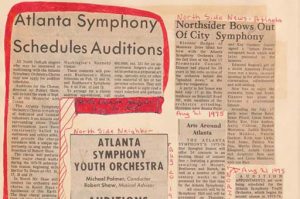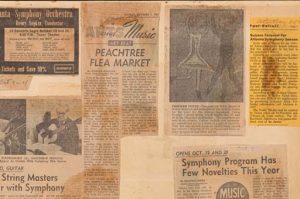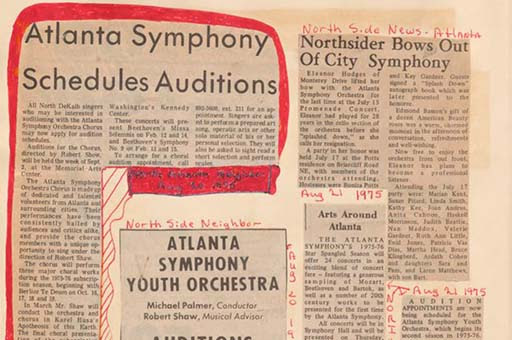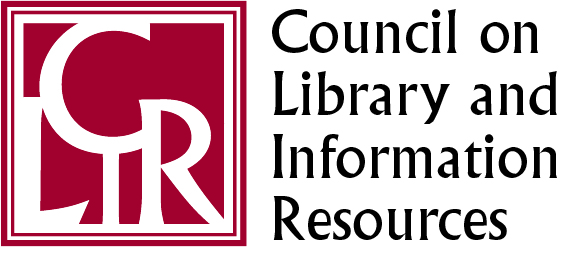In partnership with the Georgia State University Special Collections and Archives (Music and Broadcasting Collections) the Digital Library of Georgia (DLG) has digitized 24 scrapbooks from the Atlanta Symphony Orchestra (ASO) Collection dating from 1945-1985 that are now available online as part of the Atlanta Symphony Orchestra Collection.
This work was done as part of a competitive digitization grant intended to broaden partner participation in the DLG and provide digitization services costing up to $7500 for historic collections from non-profit Georgia cultural heritage institutions.
In 2017, the ASO donated its institutional records to GSU Special Collections and Archives. Among these records were the scrapbooks, which include newspaper clippings of concert previews, reviews, and highlights of guest performers, composers, and conductors, as well as photographs, advertising materials, and organizational records such as memos and correspondence.
Kevin Fleming, the popular music and culture archivist at Georgia State Libraries Special Collections describes the significance of this material that documents the arrival of the ASO’s Music Director Robert Shaw in the late 1960s, and the effects of the Civil Rights movement on the orchestra:
“The few scrapbooks from this time period show similar changes as it relates to the orchestra. Nick Jones, ASO’s former program annotator, indicates that ‘under Shaw’s leadership, the ASO worked to improve its connections with minority communities, including actively seeking African American instrumentalists to fill vacancies in the orchestra. There are few Black soloists, instrumental or vocal, who did not perform with the ASO during Shaw’s tenure, and the Spelman and Morehouse College Glee Clubs have frequently been heard. In connection with Morehouse, the orchestra in 1972 gave the world-premiere staging of the first surviving opera by a black composer, Scott Joplin’s Treemonisha. Additionally, T. J. Anderson was the ASO’s Composer-in-Residence for the 1969-1970 season and works by African American composers including Anderson, Ulysses Kay, and George Walker were performed.’”
Kerry Brunson, a Ph.D. candidate in musicology at the UCLA Herb Alpert School of Music, describes the importance of having these materials freely available online to her students:
“My students have created award-winning projects that pull from the ASO Archive’s digitized collection of photographs and concert programs. The addition of the scrapbooks would help provide context–not only would students have access to the rare ephemera within the scrapbooks themselves, but they would also be privy to what was deemed important by the people who compiled them.”
[View the entire collection online]
###
About the Georgia State University Special Collections and Archives (Music and Broadcasting Collections)
The Georgia State University Archives Music and Radio Broadcasting Collections began as the Johnny Mercer Collection and grew to include related materials that include: other musicians’ and artists’ papers, early country, bluegrass and Southern gospel music, Atlanta Symphony Orchestra archives, and records of WSB Radio and other Georgia stations. The collection contains more than 20,000 pieces of published sheet music, Tune-Dex cards and arrangements by American songwriters, as well as 50,000 recordings from a variety of genres. For more information, visit the Music and Radio Broadcasting Collections research guides at research.library.gsu.edu/musicradio
About the Atlanta Symphony Orchestra
The Atlanta Symphony Orchestra continues to affirm its position as one of America’s leading orchestras with excellent live performances, renowned guest artist features, and engaging education initiatives. As a cornerstone for artistic development in the Southeast, the Atlanta Symphony Orchestra performs a full schedule of more than 150 concerts, including educational and community concerts, each year for a combined audience of more than a quarter-million people. Visit www.aso.org
About the Digital Library of Georgia
Based at the University of Georgia Libraries, the Digital Library of Georgia is a GALILEO initiative that collaborates with Georgia’s libraries, archives, museums, and other institutions of education and culture to provide access to key information resources on Georgia history, culture, and life. This primary mission is accomplished by developing, maintaining, and preserving digital collections and online digital library resources. DLG also serves as Georgia’s service hub for the Digital Public Library of America and as the home of the Georgia Newspaper Project, the state’s historic newspaper microfilming project.
Visit the DLG at dlg.usg.edu.
Facebook: http://facebook.com/DigitalLibraryofGeorgia/
Twitter: @DigLibGA
Selected images from the collection:

Description: Page of scrapbook containing news clippings, photographs, and ephemera detailing the concert performances and activities of the Atlanta Symphony Orchestra from 1975-1976.





